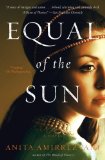 Historical figures such as Elizabeth I, Catherine the Great, or Queen Victoria are fascinating to study, given that these women overcame great odds both societally and culturally to reign with great influence on their times, but strong female figures from other parts of the globe are less well known. From Iranian author Anita Amirrezvani comes a book of historical fiction that shatters many of these stereotypes, a look at the life of Pari Khan Khanoom, a princess living in Iran in the second half of the 16th-century, who was brilliant, strong, powerful, manipulative, and ultimately shut out of power by the insecure men who surrounded her.
Historical figures such as Elizabeth I, Catherine the Great, or Queen Victoria are fascinating to study, given that these women overcame great odds both societally and culturally to reign with great influence on their times, but strong female figures from other parts of the globe are less well known. From Iranian author Anita Amirrezvani comes a book of historical fiction that shatters many of these stereotypes, a look at the life of Pari Khan Khanoom, a princess living in Iran in the second half of the 16th-century, who was brilliant, strong, powerful, manipulative, and ultimately shut out of power by the insecure men who surrounded her.
Equal of the Sun is told from the point of view of Pari’s closest advisor, the eunuch Javaher. It offers a fascinating glimpse into life in the royal palace during the late 1500s, a time of opulence and poverty, of perfumed rooms and open sewers. Javaher, as a eunuch, has access to all the palace–both the women’s quarters and the court of the Shah. He and Pari together make a formidable duo–she with her education, position, and hunger for power; he with his loyalty, access, and cunning.
Javaher is an unusual eunuch. His father was a highly-placed court official, who was accused of treason and summarily executed. To prove his loyalty to the court, Javaher has himself castrated at the age of 17. Now he’s highly-placed and well regarded, with a two-fold aim–to serve the Shah, as stated, but also to find the truth and revenge his father’s killing. As he was castrated relatively late in life (most eunuchs were created as children), he still has sexual desires, and there are some rather interesting scenes.
Pari was raised as her father the Shah’s favorite child and closest adviser. When he dies suddenly without naming an heir, she moves into intrigue, doing her best to control and manipulate which brother will be chosen to reign and which one will allow her the most freedom to influence things from behind the scenes. She is a powerful and intelligent woman, constantly thwarted by norms of the day that allowed women no overt power and influence. Pari isn’t always the most sympathetic of characters, which I liked as it rang true. She is arrogant and manipulative and cunning, but she’s right in believing that she is the most qualified to lead. Equal of the Sun is as much about court politics as it is about the daily lives of its characters, and offers a fascinating glimpse into a world that is very foreign to modern eyes.